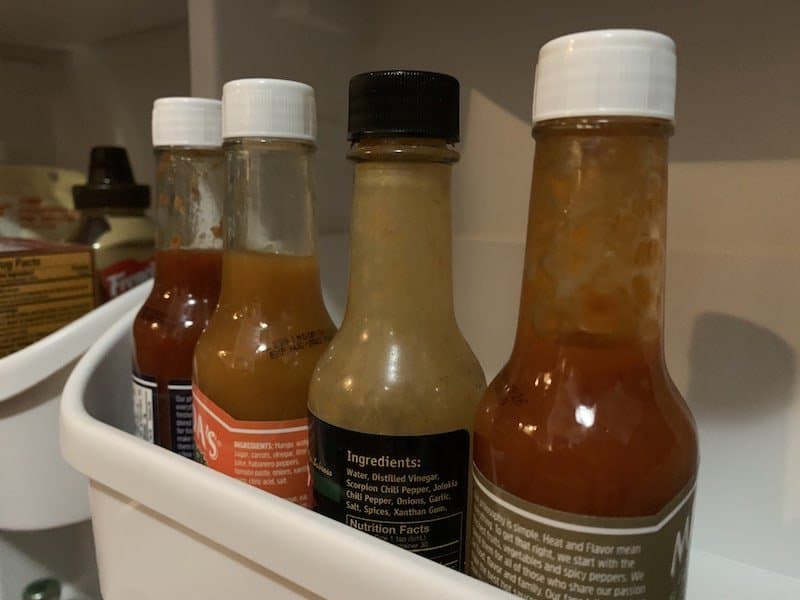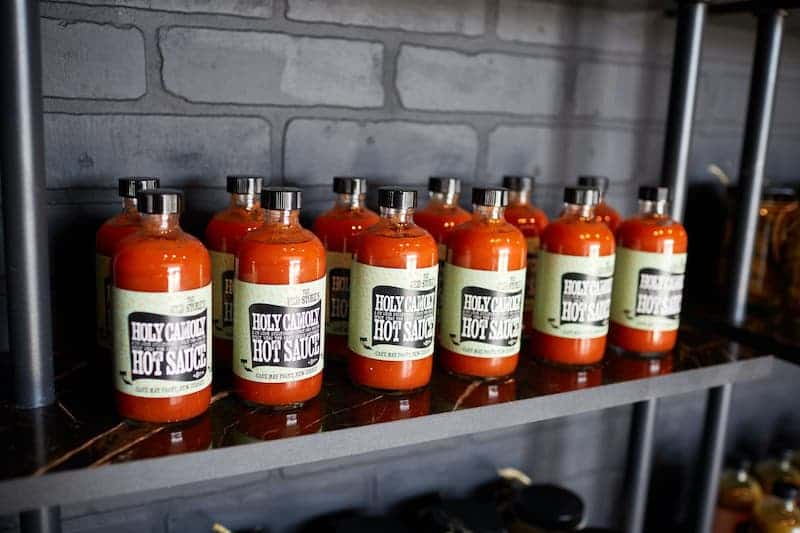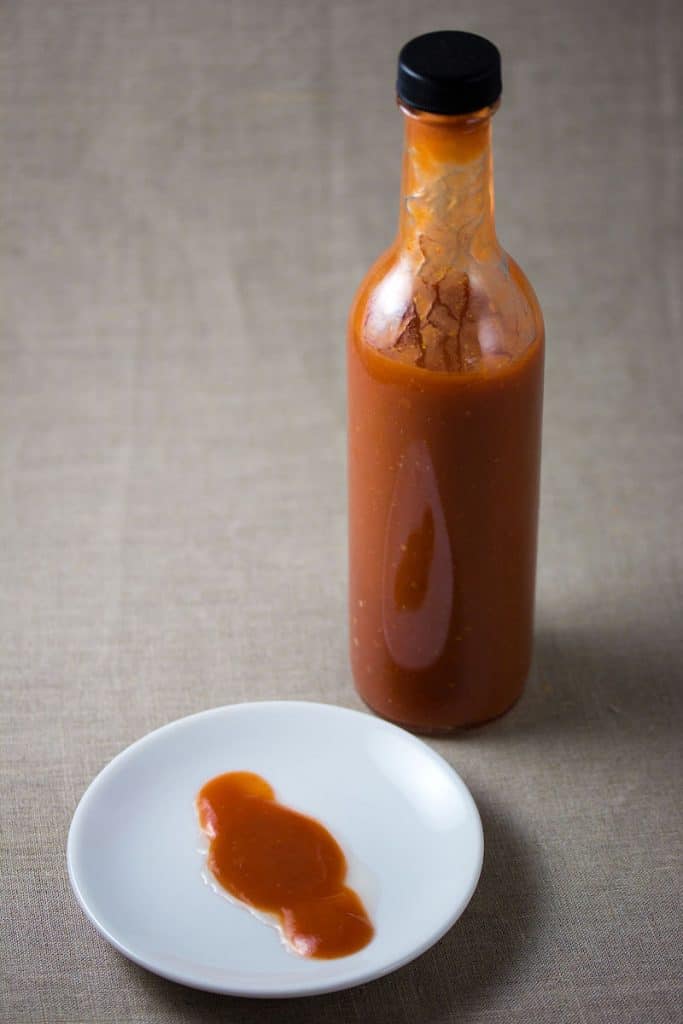How Long Does Fermented Hot Sauce Last?
In recent years, fermented hot sauces have made their way back into style because many foodies are craving the funkiness.
Not only does fermentation maximize the shelf life of your hot sauce but also improves on the already delicious flavor of pepper.
The greatest hot sauce makers in the world usually ferment their product for a good 3 months before releasing it onto the market—they call it ‘aged’ hot sauce. During this process, they accumulate so much extra flavor that really uplifts the hot sauce.
We know fermented foods last long, but exactly how long does fermented hot sauce last? Let’s explore the answer below.
How Hot Sauce Fermentation Works
Fermentation involves healthy, good bacteria (or probiotics depending on who you ask) that break down your veggies into smaller molecules.
This leads to the buildup of lactic acids, which increases the acidity and preserves the fermented hot sauce. The live bacteria don’t get killed off (unless you pasteurize it at too high heat), which is one of the main benefits of fermented foods.
One such bacterium that deserves special mention here is Lactobacillus which helps regulate digestion.
You can identify fermentation when bubbles start forming and the sauce develops a sour and tangy flavor.
Fermented Hot Sauce Shelf Life
Like non-fermented foods, fermented hot sauces also have an expiration date. The key difference is that fermented hot sauce lasts much longer.
Most fermented hot sauces can last from one to several years. Those who have been able to keep their batches fresh for many years follow a few best practices.
One of those best practices is to make sure to let your batch ferment long enough to lower its acidity. You can control the acidity by checking the hot sauce for pH value.
Also, you can boost the process by adding vinegar to increase the acidity and shelf life even further.
By taking steps like these, you can safely store fermented hot sauce in your pantry at room temperature (so without having to refrigerate it) and keep it fresh for years!
In the most likely scenario, you’ll have long consumed the fermented hot sauce before it goes bad. If you’ve followed the recipe correctly, then it should last you over a year.
Read on to the next section for more details on how to extend your fermented hot sauce shelf life.
Tips to Extend Fermented Hot Sauce Shelf Life
Firstly, it’s best to culture the hot sauce at room temperature until the color of the peppers start to change and dull. This will take around 5 to 7 days.
Fermentation is most active for the first 1 to 2 weeks, but you can ferment even longer to allow the hot sauce to develop more flavor. Click here to learn more about how long hot sauce should ferment for.
Next, adding more vinegar keeps the pH low to stop fermentation and preserve the hot sauce for longer. Tabasco, for example, can ferment for years in oak barrels with the right combination of vinegar.
Vinegar (and/or water) also helps thin your hot sauce out if it’s too thick.
Finally, using the right salt to water ratio can keep bad bacteria from causing your hot sauce to spoil.
Can Fermented Hot Sauce Go Bad?
If you’ve done everything right, then your fermented hot sauce should last you several years, but it’ll still go bad given enough time.
The perishable ingredients will eventually invite mold and bacterial growth over time. This is why it’s important to be cognizant of the tell-tale signs of spoilage (discussed below).

How Do You Know if Fermented Hot Sauce is Bad?
Given the long shelf life of fermented hot sauce, it’s easy to forget how long you’ve had it, and therefore, if it’s still okay to eat or not. There are many ways of finding out if your fermented hot sauce has gone bad.
The best thing you can do is a pH test. Using a pH strip, you can test the pH of your fermented hot sauce to see if it’s still acidic and therefore still good to eat. You want to make sure the pH is less than 3.5. If the pH is higher than 3.5, it’s time to throw it away.
You can also do secondary testing by noting the appearance, smell, and taste. I know it’s hard to throw away a great fermented hot sauce you made yourself, but it’s certainly better than dealing with food poisoning later.
Here’s how you can inspect your fermented hot sauce for spoilage:
Appearance: If your fermented hot sauce appears to have spots of whitish, fuzzy mold, throw it away. The hot sauce may change in color and texture, but that’s normal due to exposure to oxygen (especially when you open up the jar). This isn’t a concern. However, if you notice something growing in there, it’s time to trash it.
Smell: Next up is a smell test. If you notice a sour or rotten smell, then you know the fermented hot sauce has gone beyond the point of no return. However, if it smells just as delicious as ever, then you can probably still use it.
Taste: The last step would be to taste a very small sample of the fermented hot sauce. To emphasize, not a spoonful, but just a small amount to test the fermented hot sauce. If it seems a bit off, feels slimy, or unusual in any way, then spit it out right away. If it doesn’t taste bad, then your fermented hot sauce is probably still okay to consume.
Does Fermented Hot Sauce Need to Be Refrigerated?
Hot sauces that have vinegar, fermented peppers, and capsaicin are less likely to go bad. Together, they reduce the pH level to stamp out any bacterial activity.
However, if your fermented hot sauce contains fruits, vegetables, and eggs, then I recommend refrigerating it, just to be on the safe side.
Did you know, you can continue the fermentation process by storing the hot sauce in the fridge? The only difference is that the process will continue at a much slower pace than usual.
Pro Tip: Oxygen can kill a healthy ferment. So don’t keep the fermented hot sauce exposed to ambient air for long periods of time. Always put the lid back on once you’ve taken out the desired amount.
In Summary
The best way to extend the shelf life of your fermented hot sauce is to make sure your jar has a tight seal. Many people prefer to use the 20% vinegar trick because it keeps the pH level down, which is good for preservation.
How long have you been able to keep your fermented hot sauce fresh? Share your tips and observations in the comments below!









